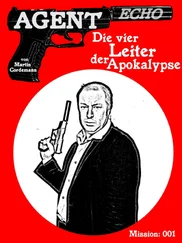Since our surprise visit to the Lepe yard, Suzanne and I had barely discussed the matter of my father’s voyage. She had asked a couple of questions about Peitersen. I’d responded to the second of these by asking if she fancied him or something. Then I’d had to dodge the book she’d thrown at me. And she hadn’t asked again. But it was as though for her, too, the Lepe trip had provided a sort of assurance. We did not talk about it. But the experience, the reality of the refurbished Dark Echo , just seemed so wholesomely far removed from the vision of Harry Spalding I’d described to her, endured aboard a canvas shrouded wreck. It seemed even more remote from the lurid mysteries of the brothers Waltrow and the gambler, Gubby Tench. In the aftermath of the Lepe visit, those events seemed far more symptomatic of their morbid and hysterical time in history than of the boat itself.
She had her bag over her shoulder, her coat over her arm. A strand of hair had fallen over her face when she had bent down to pick up her bag. She blew it away with a puff of breath. She stood there – slender, resolute and gorgeous.
‘Will it be emotional? Saying goodbye to Michael Collins?’
She smiled, looking at the floor. The smile seemed wistful. ‘There’s no room in my life for ghosts.’
I crossed the distance between us and embraced her and kissed her goodbye.
‘There’s no room in either of our lives for ghosts.’
She grazed my cheek with her fingers. ‘I love you, Martin.’
‘Thank God you do.’
The weather on the Eastern Friesland voyage was dismal. The Andromeda stank of fish oil and rotting hemp rope and brine-sodden wood. Her sails were mildew-splotched and she had a stew of ancient filth in her bilges too thick for any pump to remove that made her sluggish in the water even under full sail. She had a tendency to wallow and creaked alarmingly when subjected to the conflicting pressures of wind and current.
There were eight of us aboard, so she was overmanned. I spent a lot of time at first being superfluous to requirements, watching the sea over the ship’s rail at the stern for want of anything better or more instructive to do. But it was instructive, watching the waters of the North Sea. They were restless, churning, never still. I’d always considered the sea supine, except in a storm. But that was because I was almost wholly ignorant of it. It was a living element, debating with itself, seemingly in turmoil over what to do with its profound depth and awesome energy. At night it seemed calmer. But the night traffic on the surface of the sea made it dangerous if you were not alert.
Vomit was added to the horrible cocktail of smells about two hours after dawn on the second day out when we hit a heavy squall that brought with it a four-foot swell. We roped in the sails. The boat bucketed through the waves and I could feel the old timbers judder with impact under my feet. I knew it would take a lot more than we were heading into for the Andromeda to break up and founder. She’d been built for this weather, and worse. On the other hand, she was a venerable craft. And though authenticity was all very well, she did not seem to have been very well cared for.
The sea was a sullen green colour under a pewter sky. The wind blowing from Arctic Norway was a needling blast that numbed any flesh not covered. The deck was awash with rain and sea spray. I was wearing oilskins over trousers and a sweater woven from oiled wool. My sou’wester flapped, trying to tear itself from my head. And I found myself grinning. I was enjoying this, the being out and exposed to something so elemental. Elsewhere, men were out in this trying to catch fish, or deliver cargos, or rehearse for wars. I had no such responsibility and could just revel in the moment.
I felt a tap on my shoulder and turned. It was Captain Straub, the Andromeda ’s master. Out of my reverie, I looked around. We were the only two people above the deck. ‘I see you’ve got your sea legs,’ he shouted. He grinned at me through his beard, which was grey and waterflecked. He was Dutch and his accent was very strong.
‘I think I was born with them, Captain.’
‘Then you’re lucky,’ he said. ‘Would you care to take the wheel, Mr Stannard?’
‘I’d be delighted, Captain.’
‘Just keep her on a straight course.’
Straub probably fancied a smoke or needed a pee or something. We were too far out from land for me to run her aground and it takes two to orchestrate a collision at sea and the bloke at the wheel of the other vessel would be competent. Nevertheless, I felt a grown-up thrill of accomplishment at being entrusted with the wheel. It meant the boat was in my hands; I was responsible for the other seven souls aboard her. The pleasure I felt brought home to me how little I had actually accomplished in my life. But that realisation did not spoil the pleasure itself. It was hardly a surprise, a revelation. We live in an age of diminished accomplishment. For the moment, I thought that steering a seventy-ton schooner through a storm would do pretty well for me. It was physical work. Despite the gearing between the wheel and the rudder, I could feel the force of the swell and the weight of the boat through my arms. There was a binnacle compass on a column next to the wheel. I wiped droplets of water from its domed glass cover and took a reading. I knew where we were and I knew where we were going.
Land announced itself the following afternoon in ragged grey humps on the grey horizon. Grey, too, were the faces of our birdwatchers, gaunt with retching, glad to get into the rowing boat lowered from the side into the choppy sea, heading for something firm under their feet when we anchored off Baltrum. I watched them go but had volunteered to stay aboard. I would have a cabin to myself. The wilderness of sand and reeds and rare birds where my shipmates were headed offered no real attractions.
Captain Straub stayed aboard, too. That evening, we dined together at his table. He was a resourceful cook. He made a sort of casserole from barley and boiled bacon and shallots. We washed it down with Weissbier and afterwards had some truly delicious Dutch cheese and his excellent brandy. It was a long way from weevil-ridden ship’s biscuits and salted herring. It was altogether a very civilised route to scurvy.
When we had finished eating, the captain rolled a cigarette from a large pouch of tobacco and sat back in his chair and I looked around me, from where I sat, at his cabin. Hunger and conversation had prevented me from properly examining my surroundings any sooner. Straub’s cabin was not as large as my father’s aboard the Dark Echo . Nor was it anything like so sumptuously well appointed. But the really remarkable thing about it was that there was nothing present in it that could not have come from the late nineteeth century. We had dined by the light of candles. An oil lamp hung from a hook above a small table under the starboard portholes. He had navigation charts rolled on a table where his sextant also reposed. He had a slide rule for his calculations, the ivory from which it had been made yellowing from decades of secretions from human hands. We had taken our depth soundings on approaching the island with a plumb line at the bow. Straub had a berth rather than a hammock and the cabin was warm from a wood-burning fire. It was a cosy enough refuge from the elements. But it seemed out of its time and would have unnerved me had I been there alone and not in company.
Straub stood and put a coffee pot on a paraffin burner on the table under the lamp. He lit the burner with a wooden match. I noticed that the boat was still beneath us. The sea had calmed. I saw that there were tendrils of fog drifting now beyond the glass of the portholes.
Читать дальше












